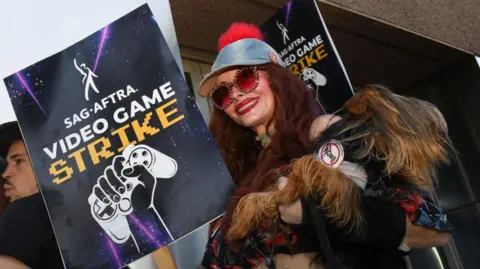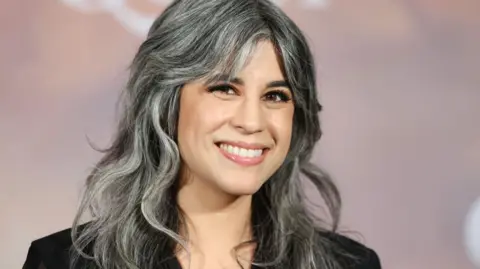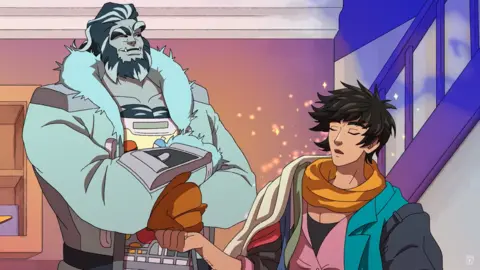Video game actors' strike officially ends after AI deal
 Getty Images
Getty ImagesVideo game actors have voted to end a year-long strike over artificial intelligence (AI) protections.
About 2,500 members of US union SAG-Aftra were involved in the action against 10 of the biggest companies in the industry, including Activision and Electronic Arts.
Both sides had spent months hashing out a deal over the use of AI to replicate an actor's performance - and "guardrails" to prevent this from happening.
The union said 95% of those who voted had backed the agreement, which also included changes to pay and health and safety protections.
Both sides had already been locked in negotiations for about 18 months when the strike began last July.
At the time, SAG-Aftra said they had agreed on 24 out of 25 disputed areas but the sticking point was using AI to replicate human performances.
The big barrier was a disagreement over motion capture actors whose work was treated as "data" rather than as a performance.
In a statement released after the vote to end the strike, the union said a new contract secured "consent and disclosure requirements for AI digital replica use".
Performers can also withdraw consent in the event of future strikes, it said.
Audrey Cooling, spokesperson for the video game companies negotiating with SAG-Aftra, said they were "pleased" members had approved a new Interactive Media Agreement.
She said it included "historic wage increases, industry-leading AI protections, and enhanced health and safety measures for performers".
 Getty Images
Getty ImagesAshly Burch is a video game actor known for her performances as Tiny Tina in the Borderlands Series and Chloe in adventure game Life is Strange.
Speaking to BBC Newsbeat after the strike was suspended so members could vote, Ashly said performers didn't want a total ban on AI in game development.
"We just don't want to be replaced by it," she said.
She said AI was "arguably a bigger threat to voice and movement performers" than actors in film and TV, and the strike's main goal was guarantees around "consent, transparency, and compensation".
"Basically you have to get our consent to make a digital replica of us," she said.
"You have to tell us how you're going to use it, and then you have to compensate us fairly."
One of Ashly's best-known characters - Aloy from Sony's Horizon series - became a talking point during the strike when an AI-powered prototype of the character leaked.
She said the response from fans to the model - which showed the character responding to prompts from a player - was reassuring.
"To a person, everyone was like, 'I don't want AI performances in my games,," she added.
Ashly has also worked on live-action projects such as Apple TV show Mythic Quest and her recent web series I'm Happy You're Here, focused on mental health.
She said both reminded her of what human beings can bring to a role.
"And that, to me, as a person that loves games and loves art, is the big risk of AI, that we're going to lose out on really interesting, evocative performances."
 Sassy Chap/Team 17
Sassy Chap/Team 17The video game actors' strike did not affect the entire industry and mostly applied to workers and projects based in the US.
And unlike the all-out 2023 Hollywood strike, video game performers were still able to work with companies that signed an interim addressing concerns over AI.
Veteran voice actors Robbie Daymond and Ray Chase, who set up their own games studio, tell BBC Newsbeat the arrangement allowed them to continue work on their debut release, Date Everything!
The game features a cast of roughly 70 well-known performers who were able to work on the project thanks to the interim deal.
But Robbie, who's appeared in Final Fantasy 15 and various anime series, says it has been a tough year for performers in the US.
"This was a long strike, and it has been heavily impactful for everybody involved," he says.
Robbie says he is aware of people whose income took a hit in an industry where many performers do short stints on multiple projects.
"I just hope people understand that when a strike goes on this long and people are talking about how serious it is for them, that it has a real human impact," he says.
Ray points out that voice actors had the option of taking work outside of video games, but the strike was especially hard for actors who specialise in motion capture.
"If you came out to Los Angeles to be a motion capture actor, then your entire existence is being threatened by AI," he says.
"Those guys are heroes for sticking out this long."
Ray also points out that the strike will have affected video game developers if they weren't able to hire actors as easily.
"Strikes are never easy on on workers. They're never easy on anybody," he says.
"We're just so happy that we've found a peaceful resolution, for sure."

